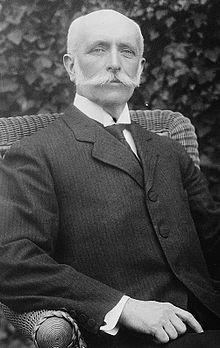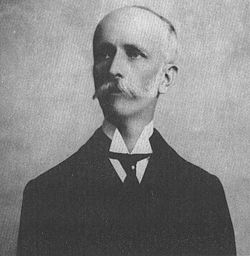| José Yves Limantour | |
|---|---|
 José Yves Limantour in 1910 José Yves Limantour in 1910 | |
| Mexican Secretary of Finance | |
| In office 8 May 1893 – 25 May 1911 | |
| President | Porfirio Díaz |
| Preceded by | Matías Romero |
| Succeeded by | Ernesto Madero |
| Personal details | |
| Born | José Yves Limantour Marquet (1854-12-26)26 December 1854 Mexico City |
| Died | 26 August 1935(1935-08-26) (aged 80) Paris, French Third Republic |
| Resting place | Montmartre Cemetery |
| Spouse |
María Cañas y Buch (m. 1880) |
| Parent(s) | Joseph Yves Limantour and Adela Marquet |
José Yves Limantour Marquet (Spanish pronunciation: [xo'se ˈiβ(e)s limanˈtuɾ]; 26 December 1854 – 26 August 1935) was a Mexican financier who served as Secretary of the Finance of Mexico from 1893 until the fall of the Porfirio Díaz regime in 1911. One of the most prominent politicians of the Porfiriato era, he was a key member of Díaz's technocratic advisors known as Los Científicos.
Born into a French Mexican family in Mexico City, Limantour received a high education. He studied economics, and after a period working as a legal teacher, he was appointed as Mexico's secretary of finance in 1893. As the secretary of finance, Limantour established the gold standard in Mexico, suspending free coinage of silver, and mandating only government coins be used. He secured the national debt in 1899 with a consortium of foreign banks, and at the time of the outbreak of the Revolution, Mexico was on strong financial basis.
Before the Mexican Revolution he was widely seen, along with General Bernardo Reyes, as one of the stronger candidates to succeed President Díaz. After the revolution broke out due to unpopularity of the Díaz regime, he went into exile in France, where he died in 1935.
Early life
| This section needs additional citations for verification. Please help improve this article by adding citations to reliable sources in this section. Unsourced material may be challenged and removed. (November 2023) (Learn how and when to remove this message) |

José Limantour was born on 26 December 1854 in Mexico City, Mexico. His parents were Joseph Yves Limantour, a ship captain from Brittany, France, and Adela Marquet, born in Bourdeaux. The Limantour family grew wealthy through land speculation in Baja California and Mexico City when the Liberals seized church property, redistributing land. After private primary schooling in Mexico, Limantour went to Europe at 14. On his return from that journey he attended the National Preparatory School. He received a law degree with specialized studies in economics and management. At the inception of Porfiriato, he was teaching at the School of Commerce and the National School of Jurisprudence. He also wrote for the legal journal El Foro (The Forum) from 1877 to 1882.
Secretary of Finance

After the death of Matías Romero Rubio in 1895, Limantour was considered the political leader of the technocratic advisers to President Díaz known as científicos ("the scientists"), who were highly educated and wanted expanded intellectualism and prosperity in Mexico. They supported the Díaz regime because of its efforts to modernize the country, yet they also wanted expanded freedom.
As Secretary of Finance, he expanded foreign investment into Mexico, supported free trade, and balanced the budget for the first time and generated a budget surplus by 1894. However, even with the economic prosperity of Mexican business, the common people of the country suffered because of the rising cost of food.
Towards the end of the Díaz regime, the president felt that Limantour was becoming too powerful, and thus he sent him to Europe to negotiate loans. Then, with the pending military collapse of the Díaz regime, he returned to Mexico and encouraged Díaz to resign. He negotiated Díaz's 1911 exit from Mexico into exile in Paris.
Exile and death

A week after Díaz set off to Europe, Limantour left for New York City by train. He arrived to Paris in July 1911, while the former dictator was resting in a seaside resort at Deauville. They exchanged letters, but they rarely met during their first months living in Paris, as Díaz resented reports that Limantour had attempted to negotiate his eventual reincorporation in the federal cabinet with the revolutionary leader, Francisco I. Madero,
Limantour had strong ties with the Madero family, as he had served as their trade agent in Mexico City. In the end, however, Madero chose his uncle Ernesto, an experienced banker from Coahuila, as his secretary of Finance and Díaz and Limantour were eventually reconciled.
Limantour remained in France for the remainder of his life. He became a member of the Académie des sciences morales et politiques and was named a grand officer of the French Legion of Honor. He died in Paris on August 26, 1935, largely forgotten.
Bibliography
- Apuntes sobre mi vida pública (Porrúa, 1965).
Sources
- Aston, B. W., "The Public Career of Don José Ives Limantour." Ph.D. dissertation, Texas Tech University 1972.
- Crosman, Herbert A. "The Early Career of José Ives Limantour, 1854-1886." Ph.D. dissertation. Harvard University 1949.
- Díaz Dufoo, Carlos. Limantour. Mexico: Edusebio Gómez de la Puente 1910.
- Schmidt, Arthur. "José Ives Limantour" in Encyclopedia of Mexico, vol. 1, pp. 746–749. Chicago: Fitzroy and Dearborn 1997.
References
- Ludlow 2002, p. 86
- ^ "Anales de la Real Academia Matritense de Heráldica y Genealogía". Anales de la Real Academia Matritense de Heráldica y Genealogía (in Spanish). XII. Madrid, Spain: Real Academia Matritense de Heráldica y Genealogía: 273. 2009. ISSN 1133-1240. Retrieved 22 September 2014.
- ^ Aston, B W (1972). The Public Career of Don Jose Ives Limantour (PDF) (dissertation). Texas Tech University. pp. 1–3. OCLC 1100000. Archived from the original (PDF) on 15 August 2011. Retrieved 3 April 2010.
- Carmona Dávila, Doralicia. "Limantour Marquet José Yves". Memoria Política de México (in Spanish). Archived from the original on 4 March 2022. Retrieved 1 May 2022.
- William Schell, Jr. "Banking and Finance, 1821-1910" in Encyclopedia of Mexico vol. 1. p. 134. Chicago: Fitzroy and Dearborn 1997.
- Schell, "Banking and Finance" p. 134.
- Soto, Miguel E (1979). "Precisiones sobre el Reyismo. La oportunidad de Porfirio Díaz para dejar el poder". Estudios de Historia Moderna y Contemporánea de México (in Spanish). 7 (83). Mexico City, Mexico: Universidad Nacional Autónoma de México, Instituto de Investigaciones Históricas: 105–133. doi:10.22201/iih.24485004e.1979.07.69040. Archived from the original on 22 July 2022. Retrieved 23 September 2014.
- Martínez Báez 1994, p. 500
- "Científico". Encyclopædia Britannica. Retrieved 23 September 2014.
- Passananti, Thomas P (Winter 2008). "Dynamizing the Economy in a façon irréguliére: A New Look at Financial Politics in Porfirian Mexico". Mexican Studies/Estudios Mexicanos. 24 (1). Berkeley, California: University of California Press: 1–29. doi:10.1525/msem.2008.24.1.1. JSTOR 10.1525/msem.2008.24.1.1.
- ^ Tello Díaz, Carlos (2013). El exilio: Un relato de familia [The Exile: A Family Story] (in Spanish). Mexico City, Mexico: Penguin Random House, Grupo Editorial México. pp. 29–30. ISBN 9786073117968. Retrieved 23 September 2014.
- Arthur Schmidt, "José Ives Limantour" in Encyclopedia of Mexico, vol. 1, p. 748. Chicago: Fitzroy and Dearborn 1997.
- "Ernesto Madero Farías". Galería de secretarios (in Spanish). Secretaría de Hacienda y Crédito Público. Retrieved 23 September 2014.
- Schmidt, "Limantour", p. 748.
- Limantour, José Yves (1965). Apuntes sobre mi vida pública (in Spanish). Mexico City, Mexico: Porrúa. OCLC 411559.
Sources
- Ludlow, Leonor (2002). Los secretarios de hacienda y sus proyectos, 1821-1933 (in Spanish) (1st ed.). Universidad Nacional Autónoma de México. ISBN 970-32-0285-3.
- Martínez Báez, Antonio (1994). Obras político-constitucionales (in Spanish). Universidad Nacional Autónoma de México. ISBN 968-36-3398-6.
External links
- Guide to the José Yves Limantour Papers at The Bancroft Library
 Media related to José Yves Limantour at Wikimedia Commons
Media related to José Yves Limantour at Wikimedia Commons
| Secretaries of Finance and Public Credit | ||
|---|---|---|
| 19th century |
|  |
| 20th century | ||
| 21st century | ||